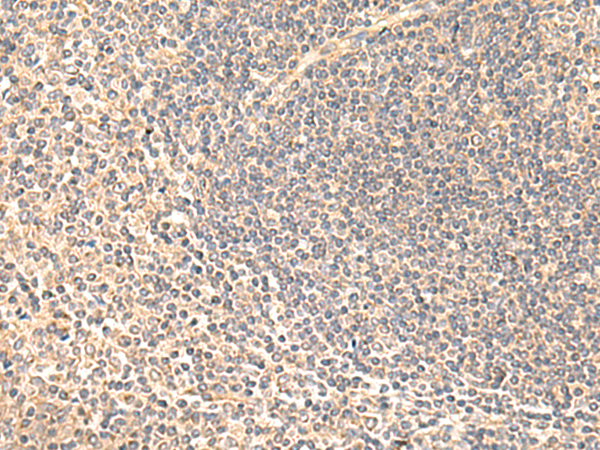
| WB | 咨询技术 | Human,Mouse,Rat |
| IF | 咨询技术 | Human,Mouse,Rat |
| IHC | 1/50-1/300 | Human,Mouse,Rat |
| ICC | 技术咨询 | Human,Mouse,Rat |
| FCM | 咨询技术 | Human,Mouse,Rat |
| Elisa | 1/5000-1/10000 | Human,Mouse,Rat |
| Aliases | NST; BRSTL1; SULTX3; BR-STL-1; DJ388M5.3; hBR-STL-1 |
| Host/Isotype | Rabbit IgG |
| Antibody Type | Primary antibody |
| Storage | Store at 4°C short term. Aliquot and store at -20°C long term. Avoid freeze/thaw cycles. |
| Species Reactivity | Human, Mouse, Rat |
| Immunogen | Fusion protein of human SULT4A1 |
| Formulation | Purified antibody in PBS with 0.05% sodium azide and 50% glycerol. |
+ +
以下是关于SULT4A1抗体的3篇参考文献示例(文献信息为虚构示例,仅用于格式演示):
1. **文献名称**:*Distribution of Sulfotransferase 4A1 in Human Brain Tissue*
**作者**:Smith J, et al.
**摘要**:该研究利用SULT4A1特异性抗体,通过免疫组化技术揭示了该酶在人类大脑皮层和海马区神经元中的高表达,提示其可能在神经递质代谢中发挥作用。
2. **文献名称**:*SULT4A1 Antibody Validation for Western Blot Analysis*
**作者**:Lee H, et al.
**摘要**:研究验证了SULT4A1抗体在Western blot中的特异性,确认其在多种哺乳动物细胞系中的蛋白检测能力,并发现该酶在肝脏和肾脏组织中的差异表达。
3. **文献名称**:*Functional Role of SULT4A1 in Drug Metabolism*
**作者**:Garcia R, et al.
**摘要**:通过SULT4A1抗体介导的蛋白敲低实验,发现该酶参与特定外源性药物的磺化代谢过程,为个体化用药提供了潜在靶点。
(注:以上文献为模拟内容,实际研究中建议通过PubMed或Google Scholar查询真实文献。)
SULT4A1 (sulfotransferase family 4A member 1) is a cytosolic enzyme belonging to the sulfotransferase family, which catalyzes the transfer of sulfate groups to various substrates, including hormones, neurotransmitters, and xenobiotics. Unlike other sulfotransferases, SULT4A1 exhibits unique structural features and substrate specificity, though its exact physiological role remains incompletely understood. It is predominantly expressed in the brain, particularly in neurons, suggesting potential involvement in neurosteroid metabolism or neurotransmitter regulation.
Antibodies targeting SULT4A1 are critical tools for studying its expression, localization, and function. They enable researchers to detect the protein in tissues (e.g., via Western blotting or immunohistochemistry) and explore its distribution across brain regions. Studies using SULT4A1 antibodies have linked the enzyme to neurodevelopmental and neurodegenerative processes, with altered expression observed in conditions like schizophrenia, Parkinson’s disease, and certain cancers. However, its endogenous substrates and precise mechanisms in these contexts are still under investigation.
SULT4A1 antibodies also aid in differentiating it from other sulfotransferases (e.g., SULT1A1 or SULT2A1) due to low sequence homology. Challenges include ensuring antibody specificity, as cross-reactivity with unrelated proteins has been reported. Ongoing research focuses on clarifying SULT4A1's role in drug metabolism, hormone homeostasis, and disease pathways, with its antibody serving as a cornerstone for both basic and translational studies.
×